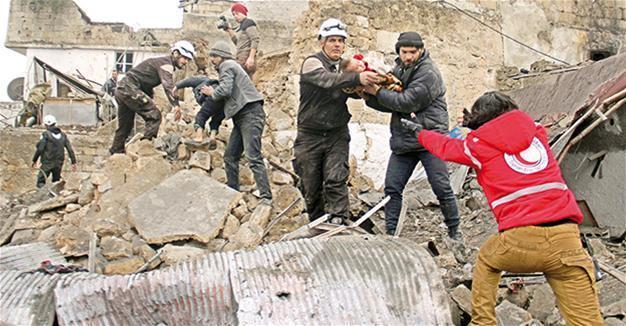Lavrov says US invited to Syria talks in Astana
MOSCOW

AFP photo
Russia has invited the U.S. to take part in the upcoming intra-Syrian talks in the Kazakh capital of Astana on Jan. 23, Russian Foreign Minister Sergei Lavrov said on Jan. 19.“The U.S. have already been invited,” Lavrov told reporters in Moscow, according to state-run Anadolu Agency.
Previously, Lavrov had said invitations for the talks in Astana had been sent, but the participant list would only become clear after official replies
On Jan. 19, Russian Deputy Foreign Minister Mikhail Bogdanov met John Tefft, U.S. ambassador to Russia to discuss the Syrian crisis as well as the Astana talks, the Foreign Ministry said.
Negotiations between the Syrian government and opposition negotiators to reach a political solution to the six-year war in Syria are due to begin on Jan. 23.
Following last month’s Syria cease-fire deal, brokered by Turkey and Russia, the Astana meeting comes as part of ongoing efforts by the two countries to promote a political solution in war-torn Syria.
The United Nations’ peace envoy for Syria, Staffan de Mistura, will attend the Astana talks, the U.N. spokesman Stephane Dujarric said on Jan. 19.
U.N. Secretary-General Antonio Guterres asked de Mistura to attend “in light of the complexity and importance of the issues likely to be raised in Astana, and of the senior level at which the conveners of the meeting will be represented,” said Dujarric.
Guterres “is looking forward to the Astana meeting being a positive step, ahead of the resumption of intra-Syria negotiations in Geneva,” he added.
U.N.-brokered peace talks on Syria are due to resume in Geneva on Feb. 8.
Meanwhile, key rebel group Ahrar al-Sham said on Jan. 18 that it would not take part in the peace talks next week.
Ahrar al-Sham, which counts thousands of fighters in central and northern Syria, said it would not attend the Astana talks due to “the lack of implementation of the cease-fire” in force since Dec. 30, 2016 and ongoing Russian air strikes over Syria.
The Islamist faction was among the signatories of the cease-fire deal that does not include ISIL and Fateh al-Sham, which changed its name from the al-Nusra Front after breaking ties with al-Qaeda.
The truce, brokered by regime supporter Russia and rebel backer Turkey, has largely held across Syria although fighting has persisted in some areas.
Ahrar al-Sham cited “the regime’s offensive against our people in Wadi Barada”, an area 15 kilometers (10 miles) northwest of Damascus that is the capital’s main source of water, among its reasons for staying away from the talks.
The Syrian Observatory for Human Rights, a London-based war monitor, said Syrian government forces encircled the Wadi Barada region on Jan. 18.
Forces loyal to Syrian President Bashar al-Assad cut the route between Wadi Barada and adjacent rebel-held territory in Qalamoun, according to the Observatory.
“After an advance from the north on Jan. 18, regime forces and allied fighters, primarily [Lebanese Shiite movement] Hezbollah, besieged Wadi Barada,” said Observatory head Rami Abdel Rahman.
He said around 20,000 people were in the area under siege.
Speaking to Japanese media, al-Assad said peace talks in the Kazakh capital will focus on enforcing a cessation of hostilities to allow aid access across the country.
“I believe that they will focus, in the beginning, and will prioritize, as we see it, reaching a ceasefire,” Assad told Japanese television channel TBS, according to excerpts released by his office, as reported by AFP.
“This will be to protect people’s lives and allow humanitarian aid to reach various areas in Syria,” he said.
















